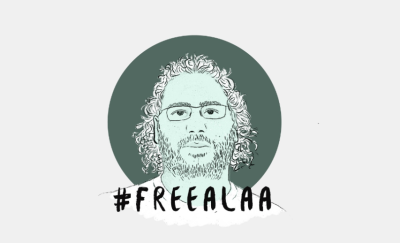
As the United Nations Climate Change Conference (COP27) was launched in Sharm El Sheikh, Egypt on 6 November, and as global leaders, governmental representatives and policy makers convened to negotiate climate justice, British-Egyptian human rights defender (HRD) and prisoner of conscious, Alaa Abdel Fattah, drank his last glass of water in an Egyptian prison after being on more than 200 days of partial hunger strike. If not released, Alaa will die before the end of COP27.
The undersigned Palestinian organizations stress on the interconnected nature of the climate justice struggle with human rights, social justice and struggles of self-determination and freedom. We thereby demand that States situate human rights and freedoms at the core of their negotiations at COP27 to allow for an inclusive and genuine global climate summit. We join our voices to the global voices calling for the immediate release of Alaa Abd El Fattah and all Egyptian, Palestinian and political prisoners across the globe, arbitrarily arrested and detained solely for exercising their human rights.
Climate justice cannot be separated from human rights. On the one hand, climate change significantly affects the enjoyment of fundamental human rights including the right to safe and adequate water and food, the right to health, adequate housing, education, as well as the right to development and self-determination. On the other hand, it is global regimes of colonialism, neoliberalism, occupation, racial discrimination, and authoritarianism, which violate and deprive people of their human rights, including their political, civil, and socio-economic rights, their right to self-determination, their right to full sovereignty of their lands and natural resources, thereby standing as a key driver to entrenching the climate crisis.
At the same time, standing at the forefront of the climate justice movement are indigenous peoples, grassroots movements for social justice, civil society organisations, and HRDs, including environmental HRDs, as highlighted by the UN Special Rapporteur on the Rights to Freedom of Peaceful Assembly and of Association.[1] Under international human rights law, States are obliged to refrain from applying laws and engaging in practices that interfere with the exercise of the rights to freedom of peaceful assembly and of association, as well as to promote an enabling environment, within which these rights can be effectively exercised.[2] States are also obliged to fulfil the collective right to self-determination of people, including their right to freely determine their political status and freely pursue their economic, social and cultural development, and their right to full sovereignty over their natural resources and wealth.[3] Additionally, both the UN Framework Convention on Climate Change, and the Paris Agreement oblige State Parties to facilitate public participation in addressing climate change.[4]
Regrettably, instead of uplifting the justice struggle, including the climate justice struggle, many States have been violating the rights and freedoms of HRDs and civil society through physical attacks, killings, smear campaigns, restrictions on peaceful assemblies, arbitrary arrests, criminalization, judicial harassment and surveillance.[5] In colonial and authoritarian contexts, States have relied on counterterrorism laws and security pretexts for such violations. These repressive actions are not only in contravention of international human rights law, they are also an embodiment of global systems of oppression interested in maintaining the political status quo to expand their colonial domination, powers and profit.
In September 2021, Alaa Abdul Fattah wrote from his prison cell: “I’ve been on hunger strike four times … and each time I remember the Palestinian captives’ strike. Palestine’s always on my mind… Does a captive have the right to ask for help from the besieged? I know that these questions show how ancient I am, but I’m an Arab and Palestine’s always on my mind. And, in my defense, I’ll say that I refused to be humiliated in my country, and I never lowered my banners, and it should count that I stood in the face of my oppressors: an orphan, naked and barefoot, and my solace is that the tragedy I’m living is but my share of yours. I call out to you: you are always on my mind.” The undersigned organisations reiterate that freedom in Palestine will not be complete without freedom of all people under systems of colonialism, occupation, racial discrimination, and authoritarianism.
The signed Palestinian Civil Society Organizations and Networks:
- Addameer Prisoner Support and Human Rights Association
- Al-Haq, Law in the Service of Man
- Center for Defense of Liberties & Civil Rights "HURRYYAT"
- Defense for Children International - Palestine
- Palestinian BDS National Committee (BNC)
- The Civic Coalition for Palestinians Right in Jerusalem
- The Palestinian Initiative for the Promotion of Global Dialogue and Democracy – MIFTAH
- The Palestine Institute for Public Diplomacy
- The Palestinian NGOs Network (PNGO)
- The Women’s Center for Legal Aid and Counselling
[1] UNGA, “Exercise of the rights to freedom of peaceful assembly and of association as essential to advancing climate justice” (23 July 2021) UN Doc A/76/222.
[2] Ibid.
[3] Common Article 1 of the International Covenant on Civil and Political Rights and the International Covenant on Economic, Social and Cultural Rights.
[4] UN Framework Convention on Climate Change, art. 6; Paris Agreement, articles 7 and 12.
[5] UNGA, “Exercise of the rights to freedom of peaceful assembly and of association as essential to advancing climate justice” (23 July 2021) UN Doc A/76/222.